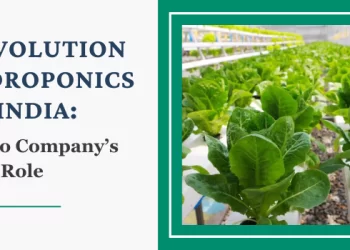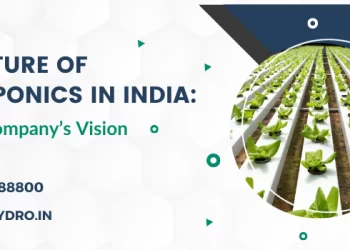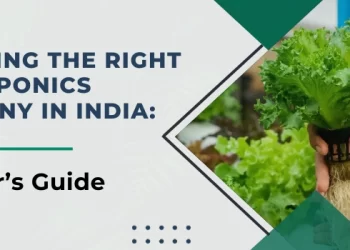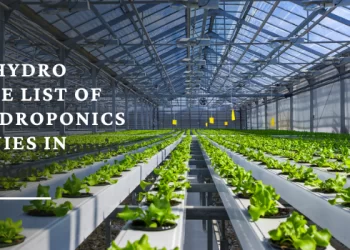
The 5 Most Important Factors to Consider When Choosing a Hydroponic Nutrient Solution in India
Hydroponic nutrient solution are essential for the success of any hydroponic garden, so it’s important to choose the right one for your needs. When selecting a hydroponic solution, there are five key factors to consider: the hydroponic solution’s price, the type of plant being grown, the nutrient content, the pH level, and the application method. With the right combination of these factors, you can maximize the growth of your hydroponic garden and get the best results.
pH Level
When choosing the right hydroponic solution for your plants, one of the most important things to consider is the pH level. The pH level affects how efficiently the nutrients are absorbed by the plants, and if it is too high or too low, it can result in nutrient deficiencies and growth problems. The ideal pH level for a hydroponic solution is between 5.5 and 6.5. It is also important to note that the pH level will change over time, so you need to regularly monitor it and adjust as necessary. When purchasing a Hydroponic Nutrients Solution, be sure to check the label for the recommended pH level and adjust accordingly. Many solutions come with a pH meter included at an affordable hydroponic solution price, so it’s worth investing in one.
Electrical Conductivity (EC)
EC stands for electrical conductivity, and it is a measure of the salts present in a hydroponic solution. The higher the EC value, the more concentrated the salts are in the hydroponic solution. This affects how much of certain Hydroponic Nutrients are available to your plants. It’s important to check the EC levels of your hydroponic solution regularly, as it will help you determine the proper Hydroponic Nutrients Solution and hydroponic solution price. Generally speaking, a higher EC value indicates a higher level of nutrients, so you should be prepared to pay a higher price for a solution with a high EC value. Additionally, if your EC levels are too high, you can reduce them by flushing your system with fresh water.
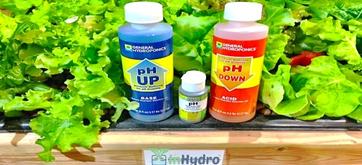
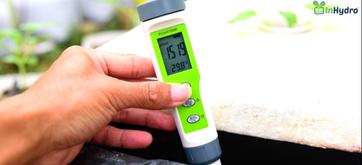
Total Dissolved Solids (TDS)
When it comes to hydroponic gardening, Total Dissolved Solids (TDS) are a critical factor to consider when choosing the right hydroponic solution for your garden. TDS is measured in parts per million (ppm), and it indicates the amount of mineral content in your hydroponic solution. Generally, you want your hydroponic solution to have a TDS between 800-1200ppm for optimal growth. If the TDS is too low, your plants won’t have enough nutrients to grow; if the TDS is too high, it can cause burning and poor growth.
To accurately measure the TDS of your hydroponic solution, you will need to purchase a TDS meter, which is relatively inexpensive. When looking for a quality meter, be sure to research the hydroponic solution price and the quality of the equipment before purchasing. This way, you’ll know that you are getting a reliable reading.
When using a Hydroponic Nutrients Solution, be sure to check the label for the TDS content. Some brands of Hydroponic Nutrients may contain more or less minerals than others, so it’s important to double check. It’s also important to note that you will need to adjust the TDS content of your solution depending on the type of plants you are growing and the stage of growth.
TDS plays an important role in the health and growth of your plants, so make sure that you are taking the time to properly measure and adjust it before adding your Hydroponic Nutrients Solution to the reservoir. With proper maintenance, your plants will thrive and provide you with plenty of lush and healthy foliage!
Nitrogen (N), Phosphorus (P), and Potassium (K)
Nitrogen, Phosphorus, and Potassium (N-P-K) are essential elements for plant growth and are commonly found in most Hydroponic Nutrient Solutions. Nitrogen is important for leaf growth, Phosphorus is necessary for stem and root growth, and Potassium helps to strengthen stems and enhance the overall health of the plant. When considering the price of a Hydroponic Solution, keep in mind that higher levels of N-P-K usually mean higher quality solutions and better results.
It’s important to understand the ratio of N-P-K and how it affects the hydroponic solution price. For example, if you are using a Hydroponic Nutrients Solution with high nitrogen content, then you may need to supplement with extra phosphorus or potassium to get the correct ratio for optimal growth. The ideal ratio for optimal growth depends on the specific type of crop being grown.
When choosing a Hydroponic Nutrients Solution, be sure to research what your specific crop needs in terms of N-P-K ratios and adjust your purchase accordingly. The right combination of N-P-K will ensure you get the most out of your investment and ensure that your plants receive the best possible nutrition for their needs.
Water Hardness
Water hardness is an important factor to consider when choosing a hydroponic solution. The hardness of the water can affect the absorption and availability of nutrients in a hydroponic nutrient solution. Water hardness is measured by the amount of calcium and magnesium ions in the water and is usually expressed in milligrams of calcium carbonate per liter of water (mg/L). Hard water typically has a high level of calcium and magnesium ions while soft water usually has a low level.
Soft water is generally preferred for hydroponic nutrient solutions because it contains fewer minerals, making it easier for the plants to absorb the necessary nutrients. If the water used for a hydroponic system is hard, then it may be necessary to use a water softener or add additional nutrients to the solution to ensure adequate nutrition for the plants. Additionally, the cost of a hydroponic solution may increase if you need to purchase a water softener or additional nutrients.
Overall, it is important to keep in mind that water hardness can play a significant role in the effectiveness of a hydroponic nutrient solution. When considering a hydroponic solution, make sure to check the hardness of the water and take any necessary steps to adjust it for optimal results.
Conclusion
Choosing the right Hydroponic nutrient solution is essential for a successful crop. By considering pH level, electrical conductivity (EC), total dissolved solids (TDS), nitrogen (N), phosphorus (P), and potassium (K) as well as water hardness, growers can select the best hydroponic solution for their particular needs. While hydroponic solution price is an important factor to consider, it should not be the only factor. It is essential to select a high-quality, nutrient-rich solution in order to ensure that plants are receiving the proper nutrition needed to grow and thrive. With these considerations in mind, growers can confidently select the ideal hydroponic nutrient solution for their growing operations.
Thank you for your interest in InHydro! Whether you have questions about our hydroponics products, services and solutions or want to learn more about hydroponics, we’re here to help. Please feel free to reach out to us using the contact information below, and one of our friendly team members will be in touch with you shortly.

The 5 Most Important Factors to Consider When Choosing a Hydroponic Nutrient Solution in India
Hydroponic nutrient solution are essential for the success of any hydroponic garden, so it’s important to choose the right one for your needs. When selecting a hydroponic solution, there are five key factors to consider: the hydroponic solution’s price, the type of plant being grown, the nutrient content, the pH level, and the application method. With the right combination of these factors, you can maximize the growth of your hydroponic garden and get the best results.
pH Level
When choosing the right hydroponic solution for your plants, one of the most important things to consider is the pH level. The pH level affects how efficiently the nutrients are absorbed by the plants, and if it is too high or too low, it can result in nutrient deficiencies and growth problems. The ideal pH level for a hydroponic solution is between 5.5 and 6.5. It is also important to note that the pH level will change over time, so you need to regularly monitor it and adjust as necessary. When purchasing a Hydroponic Nutrients Solution, be sure to check the label for the recommended pH level and adjust accordingly. Many solutions come with a pH meter included at an affordable hydroponic solution price, so it’s worth investing in one.
Electrical Conductivity (EC)
EC stands for electrical conductivity, and it is a measure of the salts present in a hydroponic solution. The higher the EC value, the more concentrated the salts are in the hydroponic solution. This affects how much of certain Hydroponic Nutrients are available to your plants. It’s important to check the EC levels of your hydroponic solution regularly, as it will help you determine the proper Hydroponic Nutrients Solution and hydroponic solution price. Generally speaking, a higher EC value indicates a higher level of nutrients, so you should be prepared to pay a higher price for a solution with a high EC value. Additionally, if your EC levels are too high, you can reduce them by flushing your system with fresh water.

Total Dissolved Solids (TDS)
When it comes to hydroponic gardening, Total Dissolved Solids (TDS) are a critical factor to consider when choosing the right hydroponic solution for your garden. TDS is measured in parts per million (ppm), and it indicates the amount of mineral content in your hydroponic solution. Generally, you want your hydroponic solution to have a TDS between 800-1200ppm for optimal growth. If the TDS is too low, your plants won’t have enough nutrients to grow; if the TDS is too high, it can cause burning and poor growth.
To accurately measure the TDS of your hydroponic solution, you will need to purchase a TDS meter, which is relatively inexpensive. When looking for a quality meter, be sure to research the hydroponic solution price and the quality of the equipment before purchasing. This way, you’ll know that you are getting a reliable reading.
When using a Hydroponic Nutrients Solution, be sure to check the label for the TDS content. Some brands of Hydroponic Nutrients may contain more or less minerals than others, so it’s important to double check. It’s also important to note that you will need to adjust the TDS content of your solution depending on the type of plants you are growing and the stage of growth.
TDS plays an important role in the health and growth of your plants, so make sure that you are taking the time to properly measure and adjust it before adding your Hydroponic Nutrients Solution to the reservoir. With proper maintenance, your plants will thrive and provide you with plenty of lush and healthy foliage!
Nitrogen (N), Phosphorus (P), and Potassium (K)
Nitrogen, Phosphorus, and Potassium (N-P-K) are essential elements for plant growth and are commonly found in most Hydroponic Nutrient Solutions. Nitrogen is important for leaf growth, Phosphorus is necessary for stem and root growth, and Potassium helps to strengthen stems and enhance the overall health of the plant. When considering the price of a Hydroponic Solution, keep in mind that higher levels of N-P-K usually mean higher quality solutions and better results.
It’s important to understand the ratio of N-P-K and how it affects the hydroponic solution price. For example, if you are using a Hydroponic Nutrients Solution with high nitrogen content, then you may need to supplement with extra phosphorus or potassium to get the correct ratio for optimal growth. The ideal ratio for optimal growth depends on the specific type of crop being grown.
When choosing a Hydroponic Nutrients Solution, be sure to research what your specific crop needs in terms of N-P-K ratios and adjust your purchase accordingly. The right combination of N-P-K will ensure you get the most out of your investment and ensure that your plants receive the best possible nutrition for their needs.
Water Hardness
Water hardness is an important factor to consider when choosing a hydroponic solution. The hardness of the water can affect the absorption and availability of nutrients in a hydroponic nutrient solution. Water hardness is measured by the amount of calcium and magnesium ions in the water and is usually expressed in milligrams of calcium carbonate per liter of water (mg/L). Hard water typically has a high level of calcium and magnesium ions while soft water usually has a low level.
Soft water is generally preferred for hydroponic nutrient solutions because it contains fewer minerals, making it easier for the plants to absorb the necessary nutrients. If the water used for a hydroponic system is hard, then it may be necessary to use a water softener or add additional nutrients to the solution to ensure adequate nutrition for the plants. Additionally, the cost of a hydroponic solution may increase if you need to purchase a water softener or additional nutrients.
Overall, it is important to keep in mind that water hardness can play a significant role in the effectiveness of a hydroponic nutrient solution. When considering a hydroponic solution, make sure to check the hardness of the water and take any necessary steps to adjust it for optimal results.
Conclusion
Choosing the right Hydroponic nutrient solution is essential for a successful crop. By considering pH level, electrical conductivity (EC), total dissolved solids (TDS), nitrogen (N), phosphorus (P), and potassium (K) as well as water hardness, growers can select the best hydroponic solution for their particular needs. While hydroponic solution price is an important factor to consider, it should not be the only factor. It is essential to select a high-quality, nutrient-rich solution in order to ensure that plants are receiving the proper nutrition needed to grow and thrive. With these considerations in mind, growers can confidently select the ideal hydroponic nutrient solution for their growing operations.
Contact us at the Consulting WP office nearest to you or submit a business inquiry online.
Related Post
-
The Evolution of Hydroponics in India: InHydro Company’s Role
The Evolution of Hydroponics in India: InHydro Company’s Role India, a country with a rich agricultural heritage, is now witnessing a revolution in farming methods – hydroponics. This innovative approach to cultivation has the potential to reshape the Indian agricultural landscape. At the forefront of this evolution is InHydro, a pioneering hydroponics company in India. In this blog, we’ll explore the remarkable journey of hydroponics in India and the pivotal role played by InHydro in this transformation. The Early Stages: Hydroponics in India The concept of hydroponics, which involves growing plants without soil, was relatively unknown in India until a
11/10/2023
Read more -
The Future of Hydroponics in India: InHydro Company’s Vision
The Future of Hydroponics in India: InHydro Company’s Vision As the world grapples with increasing food demands, climate change, and limited arable land, the future of agriculture is undergoing a paradigm shift. In India, where agriculture is a cornerstone of the economy, hydroponics is emerging as a game-changer. InHydro, a pioneering hydroponics company in India, is at the forefront of this agricultural revolution. Let’s explore InHydro’s vision for the future of hydroponics in India. Agriculture Reinvented: InHydro’s Commitment InHydro envisions a future where agriculture in India is not constrained by traditional farming methods and limitations. Their commitment is to reinvent
11/10/2023
Read more -
Choosing the Right Hydroponics Company in India: A Buyer’s Guide
Choosing the Right Hydroponics Company in India: A Buyer’s Guide In the ever-evolving world of agriculture, hydroponics has emerged as a revolutionary method of cultivating crops. Hydroponic farming offers numerous advantages, from efficient space utilization to water conservation and year-round crop production. If you’re considering venturing into hydroponics in India, you’re embarking on a journey towards sustainable and high-yield farming. However, choosing the right hydroponics company is crucial to your success. In this buyer’s guide, we’ll explore essential factors to consider when selecting the best hydroponics company in India. Expertise in Hydroponic Farming First and foremost, look for a hydroponics
11/10/2023
Read more -
Why Inhydro tops the list of best hydroponics companies in India
Why Inhydro tops the list of best hydroponics companies in India In the ever-evolving landscape of agriculture, where sustainability and innovation are key, InHydro stands tall as the leading hydroponics company in India, redefining modern farming and setting standards for the industry. With a passion for growth and a commitment to providing holistic solutions, InHydro has emerged as the best hydroponics company in India, making it the go-to choice for farmers and agripreneurs alike. Cost-Effective Hydroponic Farming Solutions InHydro is committed to making hydroponics accessible to all. Their cost-effective solutions make setting up a hydroponic farm in India a reality
11/10/2023
Read more -
The Rise of Hydroponics for Sustainable Agriculture
Hydroponics is a modern and innovative method of growing plants without the need for soil. Instead, plants are grown in nutrient-rich water solutions, allowing them to absorb all the essential nutrients they need for healthy growth.
12/09/2023
Read more -
Choosing the Right Hydroponic System: Your Guide to Hydroponic Farming in India
Hydroponics is a modern and innovative method of growing plants without the need for soil. Instead, plants are grown in nutrient-rich water solutions, allowing them to absorb all the essential nutrients they need for healthy growth.
12/09/2023
Read more -
Introduction to Hydroponics: A Sustainable Farming Approach in India
Hydroponics is a modern and innovative method of growing plants without the need for soil. Instead, plants are grown in nutrient-rich water solutions, allowing them to absorb all the essential nutrients they need for healthy growth.
12/09/2023
Read more

Mr. Sandeep & Mrs. Asha
I am passionate about farming and want to do it as a hobby. I was searching for the right vendor I visited InHydro and was amazed to see they are manufacturing & building products using HDPE material. I bought 64 Plants NFT Systems for leafy and herbs along with 50 Dutch bucket systems for vine crops. Thank you Mr. Awneesh for your guidance.

Mr. Harshit Singhal
I am Harshit. This workshop refreshed me. It was meticulously planned. Each session had a good insight. Thanks to Mr. Awneesh Kumar and his team to have put up a good show. Keep spreading the knowledge sir.
-
Company Title #1
Item content. Click the edit button to change this text.
Company overview
Consulting WP is a global consulting powerhouse. We began our operations a few decades ago and have grown due to excellent relationships with our clients. We started out small, with just a few people and a small office, but today we have offices in multiple countries with hundreds of people working inside them.
We achieved our success because of how successfully we integrate with our clients. One complaint many people have about consultants is that they can be disruptive. Employees fear outside consultants coming in and destroying the workflow. Our clients face no such issues.
Consulting WP continues to grow ever day thanks to the confidence our clients have in us. We cover many industries such as financial, energy, business services, consumer products.
Our mission
Our renowned coaching programs will allow you to:
- Work fewer hours — and make more money
- Attract and retain quality, high-paying customers
- Manage your time so you’ll get more done in less time
- Hone sharp leadership skills to manage your team
- Cut expenses without sacrificing quality
- Automate your business, so you can leave for days, weeks, or even months at a time
How we work

Thank you for your interest in InHydro! Whether you have questions about our Hydroponics products, services & solutions or want to learn more about hydroponics, we’re here to help. Please feel free to reach out to us using the contact information below, and one of our friendly team members will be in touch with you shortly.
I am passionate about farming and want to do it as a hobby. I was searching for the right vendor I visited InHydro and was amazed to see they are manufacturing & building products using HDPE material. I bought 64 Plants NFT Systems for leafy and herbs along with 50 Dutch bucket systems for vine crops. Thank you Mr. Awneesh for your guidance.


